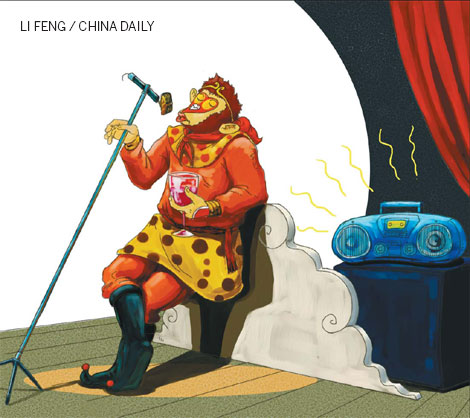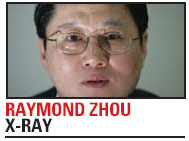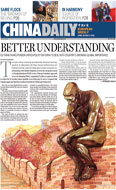View
The truth behind fakes
Updated: 2011-04-29 07:58
By Raymond Zhou (China Daily)

A quality crisis is affecting not just our food. The dubious offerings of our culture industry are sapping people's creativity, stifling innovation and giving a diverse nation one voice.
There is a joke going around that we Chinese are not afraid of nuclear radiation because we have developed an unusually tough immune system from servings of melamine-laced baby formula, cooking oil recycled from the gutter, eggs treated with industrial coloring agents, and ractopamine-fed pork, to name a few.
Others quip that the country's film censors should be given the task of monitoring food safety as they seem to care so much about guarding the purity of filmgoers and their minds.
If you think intangible products fare any better - to borrow a term from the ubiquitous "intangible heritage" - think again.
Fakery is a word not just associated with things you can touch, such as food, books and disks. (I'll get to that later.) A singing voice could be fake in the sense the singer just lip-synchs to a recording. It happens both in television studios and live concerts.
 |
To be fair, it is not always the singer's fault. The incompetence of some engineers responsible for sound mixing is at the root of the problem, at least initially. I guess producers and singers then found it convenient to focus on acting while leaving singing to the machine. Lip-synching has produced a special style of television performance, in which the singing seems so effortless, as if the singer is floating on air. The expression can only be described as ostentatiously facile.
There is no reason cultural products should be spared the scourge of quality scandals brought on by cheap copycats and unscrupulous scam artists. When demand is strong and quality goods are scarce, shoddy replacements rush into the market to fill the gap. And foreign suppliers are among those who are in it for a quick buck.
It was not too long ago that Chinese were first exposed to the Vienna New Year concert via television. Very soon, international artists started to descend on the Middle Kingdom for similar concerts. But not all of them have the artistic standards they tout. As a matter of fact, some of them could be outright imposters.
For example, among the 30-plus troupes that came to China early this year, was a Hamburg Symphony Orchestra. But, according to Tang Ruofu, a classical music expert, the real Hamburg Symphony Orchestra had engagements in Hamburg during the time it happened to be playing in China.
So, which is the real McCoy, or as we Chinese would say, the real Monkey King?
In the classic fantasy tale, the Monkey King was impersonated time and again and had to face the penalty for misdeeds committed by others in his name, or rather, in his likeness. Many characters in the novel have the ability to assume another's body or have multiple avatars. The Monkey King himself can break into dozens of similar-looking Monkey Kings and form a phalanx of fighting monkeys.
If only the Hamburg Symphony Orchestra could do that and perform in a dozen Chinese cities all at once.
Sometimes you do not have to be a charlatan to deceive the audience. Some of China's top-tier performing troupes consistently deliver substandard performances while on tour in smaller cities. A few years ago I watched a dance revue in Guangzhou - not really a small city - by a Beijing ensemble. The dancers moved their arms and legs as they were supposed to, but did not put any heart into it. Instead, their hearts seemed to be already wandering in the city's shopping streets. Still, they received thunderous applause. You could say the locals did not know better. Had they known how the performance in Beijing went, they would have booed.
As for books and disks, that is a hotbed of quick-and-dirty money-making. I'm not talking about piracy here, which is a related but different issue. When someone puts out a copy of Avatar without the consent of the copyright holder, it is piracy.
But when someone releases a movie he calls Avatar, but it has nothing to do with the James Cameron blockbuster and is out even before the real one, and carries the cover art of Cameron's Avatar, that is a scam.
In a similar vein, there are counterfeit books and there are fake books. The former at least look like the genuine ones while the latter are put together by ghostwriters who pull various texts off the Internet and slap a foreign-sounding name on the cover. And this author is usually a "Harvard professor" or some "United Nations" big shot.
So, when you approach a street vendor hawking books or discs, you'll need to know which of the following applies: an item is authentic and properly licensed; it's an illegal copy but competently done; it's an illegal copy haphazardly assembled; it's a phantom with a pompous name but nothing to back it up.
Cultural products such as books and disks tend to have low marginal costs, thus drawing a swarm of counterfeiters. Innovation calls for investment and carries risks. But the risks involved in cultural fakery is getting caught, and the crooks and frauds often seem to be one step ahead of law enforcement.
Yet, you cannot blame people for not innovating. A counterfeiter once bragged to me that whenever he pirated a CD he would add bells and whistles, like glossy photos of the singer. "That would make the real thing look cheap and like a fake," he would laugh.
Before former US president Bill Clinton's autobiography came out in Chinese, a fake edition was released in which Clinton talked about how he was inspired by "Mao Zedong thought".
If it had had a chance to sell side-by-side the real thing, I bet it might have outsold the authentically translated one. Why? The fake one was customized for Chinese sensibilities. You see, it is a common trait of "good" foreigners in Chinese textbooks to "study Chairman Mao's theory and become enlightened".
Fraud in culture does not have to come from the seedy part of society, either. High-profile artists may engage in it as well. Only the line becomes blurry when you get into the details. Say, a famous painter draws a dozen paintings very similar to one another and sells them as one-of-a-kind high art, does that constitute cheating?
A commentator criticized such practices in the press and was sued by none other than Fan Zeng, a titan of Chinese painting, who took it as an insult and released photos of the almost identical paintings as proof. Of what? Of his ability to function as a photocopy machine?
If you go to provinces and cities, you'll encounter various "replicas" of Beijing icons. There is the shrunk Tian'anmen Rostrum, the poor man's China Pavilion and the imitation Bird's Nest. If you are taken to a show, I guarantee you it'll look like a CCTV gala or a knockoff version of the Beijing Olympics Opening Ceremony. The masters of ceremony will speak the same words with the same cadences, pauses and bursts of fake jubilation.
Culture is about individuality and differences. If all speak with one voice, it would not only be one giant case of intellectual property right infringement, but a death blow to creativity.
If we do not want to wallow in the dust of imitation and homogeneity, we'd better start with our own voices, or we'll develop an immunity that is tantamount to blindness.
E-paper

Head on
Chinese household care goods producers eye big cities, once stronghold of multinational players
Carving out a spot
Back onto center stage
The Chinese recipe
Specials

British Royal Wedding
Full coverage of the royal wedding of Prince William and Kate Middleton in London. Best wishes

The final frontier
Xinjiang is a mysterious land of extremes that never falls to fascinate.

Bridging the gap
Tsinghua University attracts a cohort of foreign students wanting to come to China.
